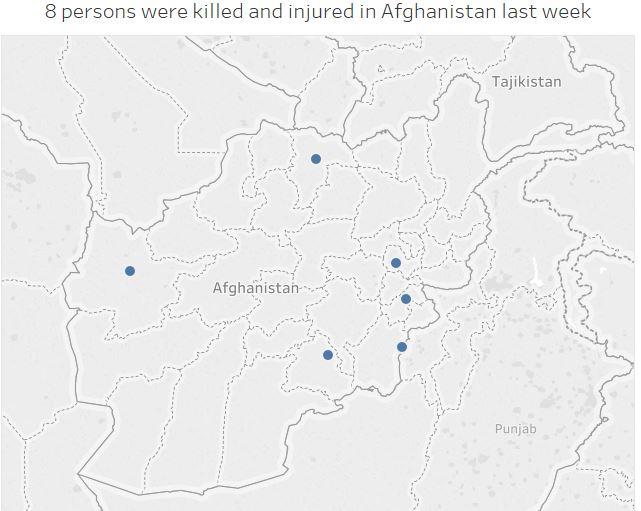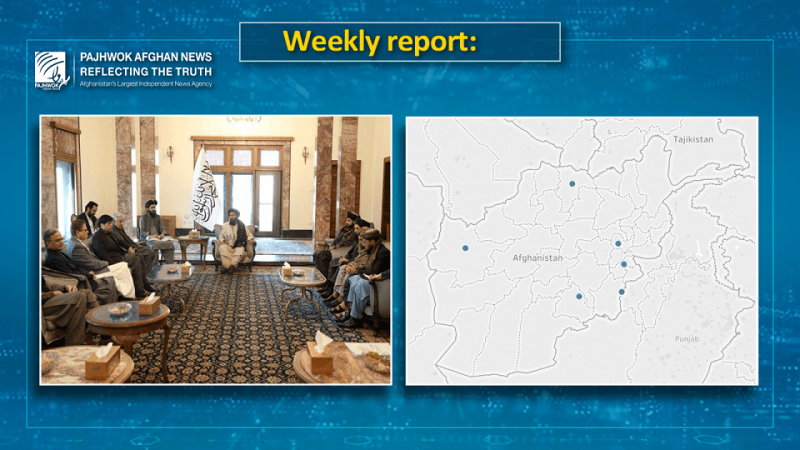KABUL (Pajhwok): Talks between Afghan officials and a visiting high-level Pakistani delegation on security and economic issues in Kabul and an American judge’s ruling that relatives of the September 11, 2001 attacks are not entitled to funds from Afghanistan central bank were important news last week, when eight people were killed and wounded in separate incidents across the country.
Last week’s major events
- Top Afghan, Pakistani officials talk security, economic issues in Kabul
- US judge says 9/11 families not entitled to Afghan bank funds
- $40m humanitarian aid arrives; five agreements to help the poor singed
- Jawzja women say girls be allowed to study within Sharia framework
Casualties
Half a dozen people were killed and two others injured in separate incidents of violence across the country last week.
According to local officials, unknown gunmen killed a person in Paktia, a money-changer was found dead under mysterious circumstances in Zabul and a child was killed in firing by Pakistani forces in Paktia.
Two armed robbers were killed during a clash with security forces in Herat and a kidnapper was also killed in a clash with security forces in Balkh.
A sticky bomb attached to a car went off in Murad Khani area of Kabul, but caused no casualties, according to officials, but eyewitnesses told Pajhwok that two children were injured in the blast.
These figures are based on reports reaching Pajhwok. Some incidents may have gone unreported or sources provided incorrect numbers.

Last week, according to sources, 16 people were killed and two others were injured in various incidents across the country.
Before the regime change, hundreds of people, including civilians, security forces and insurgents, would be killed and wounded each week.
High –level Pakistani delegation
Last week, a high-level Pakistani delegation led by Defense Minister Khawaja Mohammad Asif arrived in Kabul and held detailed talks with senior Islamic Emirate officials on security concerns, drone flights and militant activities.
Inter-Services Intelligence (ISI) head Gen. Nadeem Anjum, Special Envoy for Afghanistan Mohammad Sadiq Khan and Ambassador Nizamani accompanied the defense minister.
They held talks with deputy prime minister for economic affairs Mullah Abdul Ghani Baradar, Deputy Minister of Economy, Defense Minister Mullah Mohammad Yaqub Mujahid, Interior Minister Khalifa Sirajuddin Haqqani, Foreign Minister Mullah Amir Khan Muttaqi and Intelligence Chief Mullah Abdul Haq Wasiq.
IEA spokesman Zabihullah Mujahid tweeted that the Pakistani delegation, after meeting Deputy Prime Minister Mullah Abdul Ghani Baradar, went into talks with some other Afghan officials.
Mujahid wrote Defence Minister, Maulvi Mohammad Yaqoob, Interior Minister Serajuddin Haqqani, Foreign Minister Amir Khan Muttaqi and spymaster Mullah Abdul Haq Wasiq also took part in the discussions.
He said: “Candid and comprehensive talks took place between the two sides on security concerns, drone flights over our country and activities of militants.”
Mujahid added fruitful discussions were also held on issues like transit between the neighbours, trade ties, movements across the Durand Line and problems of Afghan refugees.
The interlocutors agreed political issues must not harm economic and trade relations between the two countries, according to Mujahid.
They stressed all such issues must be resolved through discussions and bilateral understanding. Political and economic ties must be further expanded.
The Foreign Office in Islamabad said the delegation discussed the scourge of terrorism and the threats posed by Daesh (IS) and Tehrik-i-Taliban Pakistan (TTP) with officials of the caretaker government in Kabul.
Both sides agreed to work to counter the threats and strengthen their relations in various spheres.
The Pakistani delegation arrived at a time when the Afghan authorities had ordered closed the key Torkham crossing between the two country.
The crossing was fully reopened for civilians and traders today (Saturday), allowing hundreds of stranded vehicles loaded with perishable items to proceed.
9/11 families not entitled to Afghan bank funds: US judge
A United States judge has ruled that family members of victims of the September 11, 2001, terrorist attacks are not entitled to funds from Afghanistan’s central bank.
In the ruling, US District Judge George Daniels said that awarding the families money seized from the Da Afghanistan Bank (DAB) would require an assessment that the Taliban is the legitimate government of Afghanistan, a decision he was “constitutionally restrained” from making.
In February 2022, the administration of US President Joe Biden issued a controversial executive order stating it would split $7bn in frozen assets from Afghanistan’s central bank between the Afghan people and families of 9/11 victims.
Da Afghanistan Bank or central bank welcomed the US judge’s ruling, saying the people of Afghanistan wanted the frozen money to be released in order their current economic hardships could mitigate to some extent.
Continuity of aid
Last week, a package of US$40 million in humanitarian aid arrived in Afghanistan.
The Ministry of Refugees and Repatriation last week signed five agreements with four international NGOs worth $14.5 million. Under the agreements, the foreign organizations would provide cash assistance to poor families in 15 provinces and provide them with jobs.
Women’s work and girls’ education
Dozens of women last week attended a gathering in northern Jawzjan province. They insisted on wearing Islamic Hijab and voiced their support for the Islamic Emirate and asked the caretaker government to allow girls to pursue their education in line with Sharia.
Also last week, Japanese Ambassador to Kabul, Takashi Okada met acting Interior Minister Sirajuddin Haqqani and said his country wanted continued cooperation with Afghanistan in various spheres.
The envoy hoped there would be no restrictions on girls education in the new academic year.
At the Munich security conference, female foreign ministers of Albania, Belgium, Canada, France, Germany, Iceland, Kosovo, Liechtenstein, Mongolia and Slovenia asked the caretaker government of Afghanistan to remove restrictions imposed on Afghan women.
Islamic Emirate spokesman Zabihullah Mujahid said women were being given their rights enshrined in Islam and currently they lived in a safe environment
He said women’s problems were mostly dealt with by the courts and in some spheres, there was a need to create a Shariah environment and work was underway meet Sharia conditions.
ma








GET IN TOUCH
NEWSLETTER
SUGGEST A STORY
PAJHWOK MOBILE APP